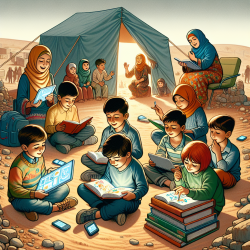In the field of speech-language pathology, creating effective outcomes for children with Autism Spectrum Disorder (ASD) is paramount. The recent study titled "Grant Report on mCARE: Mobile-Based Care for Children with Autism Spectrum Disorder (ASD) for Low- and Middle-Income Countries (LMICs)" offers valuable insights that can help practitioners improve their skills and encourage further research.
The mCARE project developed a mobile phone-based system to remotely monitor children with ASD, providing a groundbreaking approach for practitioners in LMICs like Bangladesh. The study highlighted three major issues in the care system: financial constraints, limited availability of care practitioners, and the lack of longitudinal data. mCARE addresses these issues through its mobile application, which uses the Experience Sampling Method (ESM) and Value Sensitive Design (VSD).
Key contributions of mCARE include:
- Novel mHealth System: mCARE is the first mobile-based tool to routinely and systematically collect behavior and developmental parameters for children with ASD in LMICs.
- Longitudinal Data Collection: The application allows caregivers to provide regular updates on their child's behavior and development, which practitioners can use for evidence-based decision-making.
- User-Friendly Design: The VSD approach ensures the application is culturally appropriate and user-friendly, considering local economic, social, and cultural values.
Practical Implications for Practitioners
Practitioners can leverage the findings from the mCARE study to enhance their practice in several ways:
- Implement Remote Monitoring: Use mobile-based applications to collect real-time data on children's behavior and development, which can help in making timely and informed decisions.
- Focus on Evidence-Based Decisions: Utilize the longitudinal data collected through such applications to support evidence-based treatment plans, moving away from single-visit assessments.
- Cultural Sensitivity: Design interventions that are sensitive to the cultural and economic contexts of the families, ensuring higher engagement and compliance.
Encouraging Further Research
The mCARE study also opens up avenues for further research:
- Expand to Other LMICs: Conduct similar studies in other low- and middle-income countries to validate the effectiveness of mobile-based care systems.
- Long-Term Impact: Investigate the long-term impact of remote monitoring and evidence-based decision-making on the development of children with ASD.
- Technology Integration: Explore the integration of other technologies like wearables and virtual reality to enhance the monitoring and treatment of ASD.
By incorporating these strategies and encouraging further research, practitioners can significantly improve outcomes for children with ASD in LMICs.
To read the original research paper, please follow this link: Grant Report on mCARE: Mobile-Based Care for Children with Autism Spectrum Disorder (ASD) for Low- and Middle-Income Countries (LMICs).










